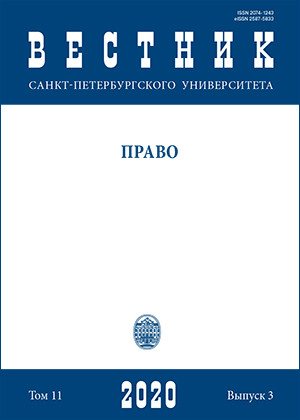The system and development of People’s Republic of China legislation
DOI:
https://doi.org/10.21638/spbu14.2020.309Abstract
The article describes the current stage of development of the People’s Republic of China, which is distinguished by the specifics used by the author. Legislative activity in the PRC as a special procedure reflecting the will of the ruling class and supporting the coercive one. The concept of “law” today includes the activities in China of central and local authorities, individual administrative bodies for the adoption of bodies, decrees, administrative acts. According to the PRC Constitution, the National People’s Congress (NPC) and its permanent body, the NPC Standing Committee, are the legislative branch. Within the autonomous administrative territories of the PRC, its legislative power, determined by the Constitution of the PRC, operates. The author turns to the history of Chinese legislation, dwelling separately on the features of autonomous territories and special administrative systems. In the conclusion of the study, three problems emerge from the theory and practice of the PRC legislation: clarification of the guidelines; determination of rights and obligations in the field of legislation; unification of the legislative process. Discussion regarding principles does not currently cross the threshold of science, proposals for practical implementation can be implemented in the future. There are no rights and obligations in the field of legislation, and the problem of risky confusion arises from the two-tier system of legislative bodies and how they are delegated. Finally, the unification of the legislative process is also important, which consists of revising old acts and adopting new achievements of the goal of the current social and technological demands of the state and society.
Keywords:
China, legislative system, Law on legislation, autonomous territories, special administrative areas
Downloads
References
Downloads
Published
How to Cite
Issue
Section
License
Articles of "Vestnik of Saint Petersburg University. Law" are open access distributed under the terms of the License Agreement with Saint Petersburg State University, which permits to the authors unrestricted distribution and self-archiving free of charge.






